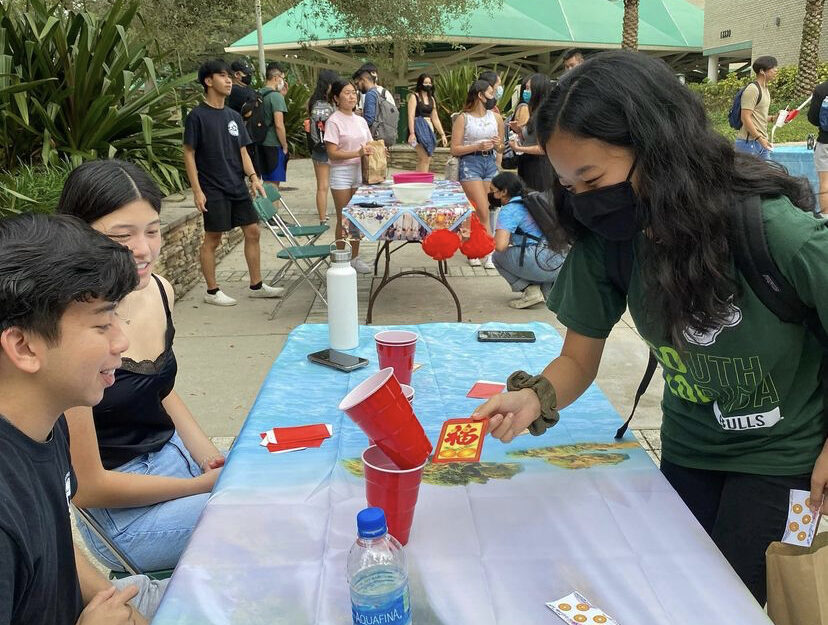Student orgs customize COVID-19 event policies

This semester, in-person events were brought back for organizations to interact more with their members, but after more than a year of connecting with students online, some groups have had to modify the way they host activities.
Since the start of the pandemic, student organizations were not allowed to have any type of in-person events, even if they were off campus. However, the restrictions were lifted at the start of the fall semester as in-person classes and activities returned.
Dean of Students Danielle McDonald sent a letter to student organizations with recommendations to mitigate risks of spreading the virus, including moving the events outside, delaying crowded indoor events, offering some virtual or hybrid events and not offering food if it’s not crucial for the event.
“As we look forward to being back on campus in a few weeks and returning to traditional campus life, we also need to be cognizant that the pandemic is not over and in fact we are in the middle of a fourth wave,” McDonald said in the letter.
Student organizations have adapted their events to align with the recommendations. Some have tried booking larger rooms to ensure social distancing, others have opted not to have food or to offer it outside the rooms so students don’t have to take their mask off inside.
Augusta Major, president of the Association for Computing Machinery Student Chapter (ACM), said it has had four events so far with about 30-60 attendees. Two of those were also streamed online so that students who were not comfortable being in person could still be part of it.
“We also wanted to keep the online format, since a lot of people wouldn’t be able to make it on time,” Major said. “Or a lot of people who were concerned about COVID-19, they would want that option to still be there.”
Unlike the university, student organizations are allowed to require face coverings for all attendees regardless of vaccination status and they were advised to do so in the letter. If organizations decided not to enforce masks, they were asked to strongly recommend them for all attendees, especially in large and indoor events. McDonald said “several” organizations are requiring masks at their events.
“Panhellenic, during sorority recruitment, required everyone to wear masks,” McDonald said. “Student Government has been requiring masks for all of their meetings, and is doing social distancing and masks for Bulls Blitz buses to the football game.”
Women in Business Society is one of those, according to its President Eryka Extejt. She said they decided to require masks rather than return to online events only, where she said students were not as engaged and some felt isolated.
“We felt it important to follow these guidelines [from Dean McDonald] to the best of our abilities because in all honesty, it’s so important to get to have these in person events, especially in the business world,” Extejt said.
“Networking is an absolutely essential skill, and while some aspects of it can be replicated in a digital format, details like body language, tone and overall engagement are absent when events are hosted online.”
In practice, however, enforcing face coverings can be hard, according to Major. For ACM’s events, the organization has been highly encouraging the use of masks but they are not requiring it. About half of the people who have attended their events have been using it, Major said.
“We’re not sure how to enforce per se, but we try to encourage it whenever we can,” Major said. “And we tried to book larger rooms than we used to so that people can space out a little bit more.”
Like ACM, the Asian Students in America organization has been recommending the use of masks but hasn’t enforced them. Tee Chulikavit, the president, said the organization preferred to ask people to put on their face coverings rather than kicking them out of their events.
“We could [kick someone out], but that’s mostly not what we’re about. We’re all about inclusion, whether or not they are wearing a mask,” Chulikavit said. “And it would be nice if they could wear masks, but pretty much the only thing we’ve agreed to do, not just me, us and other [organizations] of Asian committees, just try to encourage it, keep the pressure on them [attendees].”
So far, Asian Students in America have hosted two in-person events with 134 and 114 attendees, respectively. The majority of them were wearing masks, Chulikavit said, but in such large events sometimes it’s hard to pay attention to each person. They opted to take other precautions such as taking attendance for contact tracing and serving food with gloves.
“But in terms of the Asian committee, we’ve all sort of discussed the weight specifically on our cultural events that whether or not we do get a positive case,” Chulikavit said.
“Mostly because we are an Asian student [organization], if we get a COVID positive case, Asian hate crimes have happened in the past, and it’s not like we’re expecting one. But we’re, it’s a lot more weight on us, specifically. So we’re very careful. We’re very attentive to COVID precautions.”
Extejt said students are eager to have in-person events and interactions so there has been no trouble enforcing guidelines.
“No one showed up without one or forgot one,” Extejt said. “Everyone came prepared, and I truly think this is a reflection of the fact that people are willing to take the extra step for safety if it means they are guaranteed an opportunity to connect and engage in person.”







